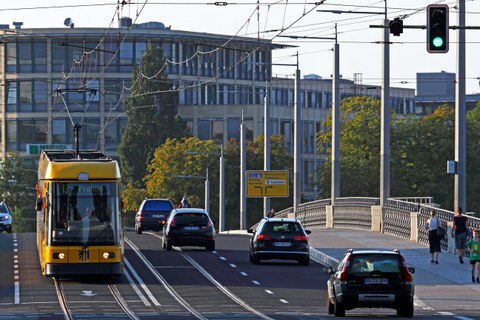Table of contents
Admission requirements
The prerequisite for admission to the program is a first university degree recognized in Germany that qualifies you for a specific profession, or a degree from a state or state-recognized university of cooperative education in the field of economics, transportation economics, or from the STEM field (mathematics, information technology, natural sciences and technology) or a degree in another course of study with a strong quantitative orientation in terms of content. In addition, special knowledge in the fields of economics, business management, and quantitative methods (mathematics, statistics, econometrics, operations research, programing, data analytics) is required. Furthermore, knowledge of English at B2 level of the Common European Framework of Reference for Language is a prerequisite. The proof of this special knowledge according to sentence 2, as well as the English knowledge, is assessed according to the aptitude assessment regulations for the master’s degree program for Transportation Economics.
Aptitude assessment procedure
The participation in an aptitude assessment or selection procedure is a prerequisite for enrollment in this degree program. Please note that the deadline for submitting an application may be earlier than the application deadlines for the degree program (see above under application deadlines). The following links will provide you with information on all documents to be submitted within the specified deadline and on the relevant regulations.
- Information and documents to be submitted
- Information on the aptitude assessment as well as the regulations for aptitude assessment can be found on the faculty website.
Notes on the application process
If, at the time of application, proof of the first degree qualifying the applicant for a profession is not yet available, the application will be considered under the precondition that 80% of the credit points attainable for the degree have already been achieved based on completed module examinations or the final thesis and the colloquium (if applicable). A certification from the awarding institute of higher education (examination office) serves as proof of the above-mentioned academic achievements. You can find the appropriate form on the Admissions Office website.
General information about the degree program
Mobility determines participation in social and economic life, the spatial structure of society, and the extent of the environmental impact caused by transportation. Its design faces immense challenges. Therefore, the means of transportation (automated driving, electric vehicles, drones, high-speed railroads), the organization of transport (intermodal mobility, sharing technologies, mobility platforms, use of big data), transport infrastructure (smart roads, charging stations) as well as the financing of mobility (user financing) are facing far-reaching changes.
This results in extensive transport-focused economic and methodological tasks on an operational, societal and methodological level. The degree program provides the knowledge and methods required to understand, research and design the challenges of mobility in terms of its economic, ecological and spatial effects.
Study contents
The compulsory module (25 credits) provides the sound methodological knowledge for this degree program.
As part of the elective modules (95 credits), students may choose two of five specializations on offer, one of five research seminars, as well as supplements from the field of economics, transportation economics, business management, transport engineering, specialized languages, and an internship.
Content of the compulsory elective modules:
Module group specializations
– Computational logistics
– Transport policy
– Spatial and environmental economics
– Statistics
– Data analytics in transportation
Module group research tasks
– Research task (from the five specializations on offer)
Module group supplements
– Transportation economics (including decision support in logistics, cost-benefit analysis in transportation, urban economics, data-driven multivariate statistics, application of data analytics, traffic flow dynamics and simulation)
– Business management (including technology management, sustainability controlling)
– Transport engineering (including transport ecology, advanced issues in psychology and behavioral economics, terminal operations)
– Economics (including resource economics, migration economics, environmental economics)
– Business informatics (e.g. Business engineering, knowledge management, SAP applications)
– Foreign language communication
Further information is available on website of the degree course.
Occupational fields
National and international, including internationally operating companies, associations, public organizations, national and international organizations, public administrations, associations, ministries, politics and policy consulting, research and teaching institutions, in particular with a connect to traffic or in the field of data science.
Study documents
The official announcements of TU Dresden include all published regulations . Please use the search bar to find the document you need: Official proclamation
The regulations are also available on each institution’s website.
- Aptitude Assessment Regulation
- Examination Regulation
- Study Regulation
… you will find on the respective site of the responsible unit.
Contacts
Admissions Office
ServiceCenterStudies
Post address:
Technische Universität Dresden
Immatrikulationsamt
01062 Dresden
- Tel.
- +49 351 463-42000
Office Hours:
Faculty of Transportation and Traffic Science
Academic Advisor
Mr. Prof. Jörn Schönberger
Faculty of Transportation and Traffic Science
Post address:
TU Dresden
Fakultät Verkehrswissenschaften "Friedrich List"
01062 Dresden
- Tel.
- +49 351 463-36815
International Office
International Office
Office address:
Bürogebäude Strehlener Str. (BSS) 22, 6. Etage, Raum 671
Post address:
TU Dresden
International Office
01062 Dresden
- Tel.
- +49 351 463-42000
Office Hours:

